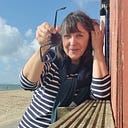How assumptions feed impostor syndrome
We all make assumptions — we are human. We all have moments of self-doubt — we are human! At a certain level both of these are healthy.
After all, making assumptions is part of our survival wiring and self-doubt can be a healthy checking process.
However — what happens when the assumptions are not helpful and actually fuel self-doubt? We are talking about the unhealthy kind of self-doubt often referred to as impostor syndrome.
Let’s look at 3 kinds of self-doubt-feeding assumptions.
Beware assuming that:
1. you know what people are thinking about you
- they think I am arrogant/dim/common/weird/bossy
2. the consensus thinking is the right thinking
- I must be wrong — they all seem to have it sorted
- The definitions of leadership/success/failure/happiness etc are the ones that everyone repeats in memes and motivational talks!
3. you are what you have been labelled as
- I am a shy type/arty type/tom-boy/over-sensitive type/stubborn mule!
You will not be alone in making these sort of assumptions on a daily basis! The more you alert yourself to what might be habitual thinking — the better!
Why do these assumptions trigger negative self-doubt responses? We are spending too much time inside our heads, not allowing ourselves to be truly present or innovative… and we are going round in self-doubt feeding circles!
How do these assumptions feed self-doubt?
Vicious cycles!
Simple!
How to break the cycles?
- Get real and rational! Look at the facts
- Stop falling into the trap of thinking what others think is paramount
- Be the one that questions default thinking — out of date definitions
- Press pause — the feeling happens — but you can control what you do/think next
- Ask for feedback! You might be surprised.
- Be the kid that says that the emperor has no clothes on! (See the Hans Cristian Andersen story)
Your confidence and communication impact will grow the more you become aware of vicious (and virtuous) cycles — and how to press the pause button, re-frame and rewire!
Enjoy the journey.
